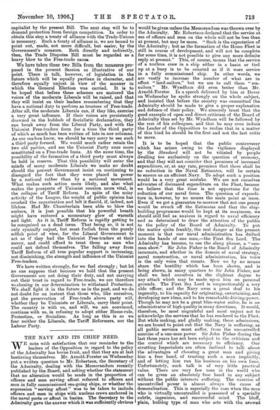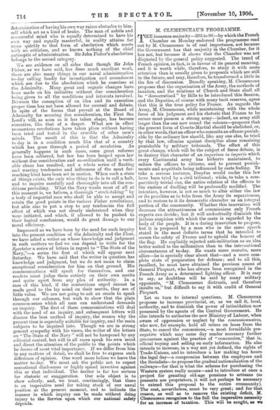THE NAVY AND ITS CHIEF NEED.
WE note with satisfaction that our reminder to the leaders of the Opposition in regard to the policy of the Admiralty has borne fruit, and that they are at last bestirring themselves. Mr. Arnold-Forster on Wednesday put a written question to Mr. Robertson, the Secretary of the Admiralty, dealing with the Memorandum recently published by the Board, and asking whether the statement that no alteration would be made in the proportion of officers and men serving afloat referred to officers and men in fully commissioned sea-going ships, or whether the expression "serving afloat" was to be taken to include officers, and men in ships with nucleus crews anchored in the naval ports or afloat in basins. The Secretary to the Admiralty gave the answer which it was sufficiently obvious would be given unless the Memorandum was thrown over by the Admiralty. Mr. Robertson declared that the service at sea of officers and men on the whole will not be less than at present, but may be more. "Such is the expectation of the Admiralty; but as the formation of the Home Fleet is still in course of development, and will not be complete for some time, it is not possible to give any more definite reply at present." This, of course, means that the service of a nucleus crew in a ship either in a basin or tied up at a buoy is to be counted as if it were service in a fully commissioned ship. In other words, we are vastly to increase the number of what are in effect "land-sailors," but we are to call them "sea- sailors." Mr. Wyndham did even better than Mr. Arnold-Forster. In a speech delivered by him at Dover on Wednesday he spoke strongly on the whole subject, and insisted that before the country was committed the Admiralty should be made to give a proper explanation and defence of their policy. We sincerely trust that the good example of open and direct criticism of the Board of Admiralty thus set by Mr. Wyndham will be followed by the rest of his colleagues, and that be may even induce the Leader of the Opposition to realise that in a matter of this kind he should be the first and not the last critic to move.
It is to be hoped that the public controversy which has arisen owing to the vigilance displayed by the Standard will not be vitiated by people dwelling too exclusively on the question of economy, and that they will not consider that promises of increased expenditure, or, at any rate, promises that there shall be no reduction in the Naval Estimates, will be certain to ensure us an efficient Navy. To adopt such a position would be a very great mistake. We are not ourselves advocates of decreased expenditure on the Fleet, because we believe that the time is not opportune for the reduction of our naval force. The question of expendi- ture is, however, by no means the main point at issue. Even if we got a guarantee to-morrow that not one penny would be struck off the Estimates and that the ship- building programme would be kept at its maximum, we should still feel as anxious in regard to naval efficiency and as determined to draw the attention of the public to the policy of the Board of Admiralty. To put the matter quite frankly, the real danger at the present moment is that our naval administration has drifted into the hands of one man,—the First Sea Lord. The Admiralty has become, to use the slang phrase, a "one- man show." Sir John Fisher is the Board of Admiralty incarnate, and whether in the domain of naval strategy, naval construction, or naval administration, his voice is the only voice that counts. Now we by no moans share the hostility which has been shown, and is being shown, in many quarters to Sir John Fisher, nor shall we lend ourselves in the slightest degree to any attack which may be made upon him on personal grounds. The First Sea Lord is unquestionably a very able officer, and the Navy owes a great deal to his ingenuity, to his capacity for originating, entertaining, and developing new ideas, and to his remarkable driving-power. Though he may not be a great blue-water sailor, he is an administrator of high quality in many directions. It would, therefore, be most ungrateful and most unjust not to acknowledge the services that he has rendered to the Fleet. But while making, and gladly making, these admissions, we are bound to point out that the Navy is suffering, as all public services must suffer, from the uncontrolled exercise of a one-man power. Sir John Fisher during the last three years has not been subject to the criticism and the control which are necessary to efficiency. Our strutting Imperialists are often inclined to talk about the advantages of choosing a great man and giving him a free hand, of trusting such a man implicitly, and of letting him run his business on his own lines. Unfortunately, such talk is of very little practical value. There are very few men in the world who can be given an absolutely free hand in any subject without the public interests suffering. The 'exercise of uncontrolled power is almost always the cause of demoralisation. This is especially the case when the man who is virtually uncontrolled is possessed of a specially subtle, ingenious, and resourceful mind. The bluff, plain, bulldog type of man who acts with the avowed determination of having his own way raises obstacles to him- self which act as a kind of brake. The man of subtle and resourceful mind who is equally determined to have his own way and equally masterful, in reality attains far more quickly to that form of absolutism which meets v, Ali no criticism, and so knows nothing of the chief antiseptic of administration. Sir John Fisher's absolutism belongs to the second category.
We see evidence on all sides that though Sir John Fisher, as we have said, has done much excellent work, there are also many things in our naval administration to-day calling loudly for investigation and amendment which are due to the absolutism which he exercises at the Admiralty. Many great and organic changes have been made on his initiative without due consideration being given to all the conditions and interests involved. Between the conception of an idea and its execution proper time has not been allowed for counsel and debate. In spite of the forms that prevail at the Board of Admiralty for securing due consideration, the First Sea Lord's will, as soon as it has taken shape, has become executive, like that of a despot. What are in effect momentous revolutions have taken place without having been tried and tested in the crucible of other men's minds. The result of this is that the Admiralty to day is in a condition much like that of a country which has gone through a period of revolution. As generally happens in such cases, some great reforms have been achieved, but law has been heaped upon law without due consideration and co-ordination until a verit- able chaos has resulted, and a whole series of floating and warring tendencies and influences of the most far- reaching kind have been set in motion. When such a state of things exists, the only wise thing to do is to call a halt, and to inquire carefully and thoroughly into all the con- ditions prevailing. What the Navy wants most of all at this moment is, we believe, a thorough " stock-taking " by a body of impartial men who shall be able to accept and retain the good points in the various Fisher revolutions, but able also to put a stop to any tendencies the full effect of which was not clearly understood when they were initiated, and which, if allowed to be pushed to their logical conclusions, would do great damage to our naval efficiency.
Impressed as we have been by the need for such inquiry into the present condition of the Admiralty and the Fleet, we have asked a writer on whose knowledge and judgment in such matters we feel we can depend to write for the Spectator a series of letters in regard to "The State of the Navy,"—a series the first of which will appear next Saturday. We have said that the writer in question has knowledge and judgment, but we do not mean to claim exceptional consideration for him on that ground. His communications will speak for themselves, and our readers must judge them entirely on their own merits and quite apart from any plea of authority. In a case of this kind, if the contentions urged cannot be made good to the lay mind on their merits, they are of little value. We are not going to ask an oracle to speak through our columns, but wish to show that the plain common-sense which all men can understand demands an inquiry. The first of these communications will deal with the need of an inquiry, and subsequent letters will discuss the best method of inquiry, the reason why the present time is especially suitable for inquiry, and the main subjects to be inquired into. Though we are in strong general sympathy with his views, the writer of the letters on "The State of the Navy" will not be hampered by any editorial control, but will in all cases speak his own mind and direct the attention of the public to the points which he deems of most vital importance. If we differ from him in any matters of detail, we shall be free to express such difference of opinion. One word more before we leave the matter to-day. We must ask the public not to expect sensational disclosures or highly spiced invective against this or that individual. The matter is far too serious for rhetoric or exaggeration. Our sole object is to show soberly, and, we trust, convincingly, that there is an imperative need for taking stock of our naval position at the present moment, and to indicate the manner in which inquiry can be made without doing injury to the Service upon which our national safety depends.















































 Previous page
Previous page